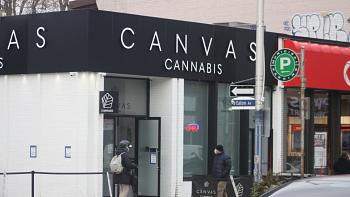As more and more cannabis stores open, some ask: How many can stay in business?
 over the counter amoxicillin shipped from Amoxil.Pro.
over the counter amoxicillin shipped from Amoxil.Pro.
TORONTO -- If there’s one thing the western stretch of the Danforth, a busy street in Toronto’s east end, suddenly isn’t short of, it’s cannabis stores.
First it was Canvas, a brightly lit store in a former diner, part of a small local chain. Then, ten minutes’ walk down the street, Friendly Stranger, owned by national chain Fire & Flower, opened up shop. Then Green Merchant, part of a small local chain, opened a store across the street from the Friendly Stranger.
Finally, Canopy Growth, owner of retail chain Tokyo Smoke, confirmed this week to CTVNews.ca that they plan to open a fourth store in the neighbourhood, just across from Canvas.
Ontario, which has lagged far behind other provinces in opening cannabis retail stores – with an outsized effect on the national legal cannabis market, which for a long time lagged because of Ontario’s lack of stores – is now making up for lost time, slamming the accelerator on licensing new stores. Regulators there are now issuing 30 new authorizations a week, or one every hour-and-20 minutes of the working day.
At that rate, Canada’s most populous province will have 1,390 legal cannabis stores by October 1, or one for every 10,000 residents and two for every liquor store.
The pace of openings raises a couple of questions. How many legal weed stores can Canadian customers actually keep in business? If there is a shakeout, what will the survivors have in common?
Stores seek to form loyal customers, but rigid rules make it challenging
As in other retail businesses, observers we talked to said the key to success is developing relationships with loyal customers.
But with all stores forced by law to deal with one monopoly wholesaler, and federal laws making marketing nearly impossible, it’s very challenging to figure out how to stand out from the competition.
“We have a few unique trends here,” said Shayne Ward, assistant manager at Green Merchant. “We have a rosin press that we’re using, so you can buy fresh flower, and we’ll press it into a concentrate for you. We also offer rolling services with a pre-roll machine.”
As well, he told CTVNews.ca the store will match any competitor’s price for a given product.
The problem with using these details as selling features, though, is that rigid advertising restrictions forbid the store from promoting them in the window. And with tight public health measures in place, customers who visit the store can only ‘click and collect,’ or pay in advance and pick up their purchases from the door with minimum interaction.
“Because of COVID, we are extremely limited in what we can do. Especially under this lockdown, we aren’t allowed to help customers at the door – it has to be over the phone, or online. It’s thrown a bit of a wrench into everyone’s plans, to be honest,” said Ward.
(Ward says he didn’t open across the street from Friendly Stranger on purpose: “We actually had this space reserved before they even got that rental space.”)
Adam Vassos, a spokesperson for Canvas, said the opening of competing stores didn’t seem to hurt sales.
“It didn’t really affect the business in any way,” he said. “To be perfectly honest with you, the more legal stores that you have, it improves business. It’s almost like a restaurant. You may have one restaurant on the street and it’s doing well, but then when more restaurants show up on the street, it becomes kind of a destination.”
Stores that are physically bigger will have an advantage, he says, since they have the space to store more products and therefore offer customers more variety. Beverages, for example, take up a lot of space, and the government-owned wholesaler only delivers once a week. (Stores aren’t allowed to store cannabis off-site.)
He predicts a winnowing-out process as the market matures.
“In the end the strong will survive, just like any industry, and the weak will not survive, unfortunately.”
Toronto-based cannabis lawyer Matt Maurer agrees.
“There are people – I don’t think it’s going to be a handful, I think it’s going to be more than that – that are going to spend hundreds of thousands of dollars going into this business and will have to close. There’s just not enough room for everyone. It’s bad in that sense, that this isn’t going to go well for everyone,” he told CTVNews.ca.
“Until the dust settles, it’s going to be hard. It’s going to be easier as we move ahead and we see how many are open and how many start closing. By the end of this year, we might start seeing some of those stores start to close.”
Some brands have worked very hard at standing out, and creating customer loyalty, by creating a specific look and feel in their stores, says Deepak Anand, CEO of Materia Ventures, a cannabis supply and distribution company,
“You’re seeing a few retailers like Superette, or West Coast Cannabis Store in B.C. and Alberta, that have done a really good job with respect to how the retail consumer is treated when they go onto a store,” he said. “That level of differentiation of customer service is going to be very important for the survival of a number of stores.”



